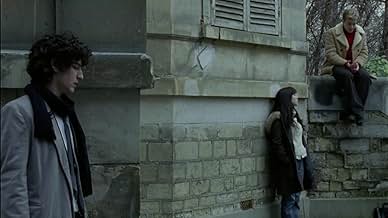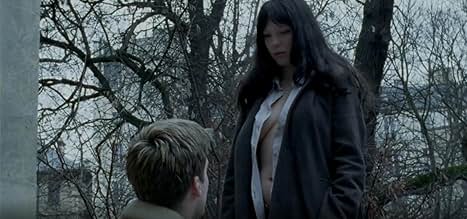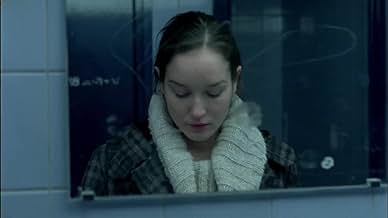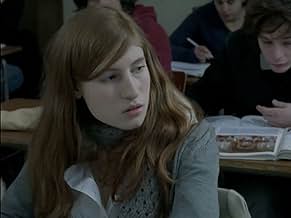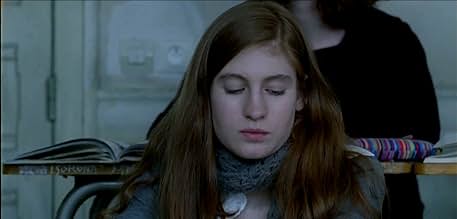IMDb रेटिंग
6.6/10
8.4 हज़ार
आपकी रेटिंग
प्यारी जूनी, अपनी माँ की मृत्यु के बाद, अपने चचेरे भाई मैथियास के हाई स्कूल और कक्षा में पढ़ना शुरू करती है. वह उसके दोस्तों से मिलती है. सभी लड़कें उसे डेट करना चाहते हैं - यहां तक कि उसके ... सभी पढ़ेंप्यारी जूनी, अपनी माँ की मृत्यु के बाद, अपने चचेरे भाई मैथियास के हाई स्कूल और कक्षा में पढ़ना शुरू करती है. वह उसके दोस्तों से मिलती है. सभी लड़कें उसे डेट करना चाहते हैं - यहां तक कि उसके सुंदर, युवा इटालियन शिक्षक भी.प्यारी जूनी, अपनी माँ की मृत्यु के बाद, अपने चचेरे भाई मैथियास के हाई स्कूल और कक्षा में पढ़ना शुरू करती है. वह उसके दोस्तों से मिलती है. सभी लड़कें उसे डेट करना चाहते हैं - यहां तक कि उसके सुंदर, युवा इटालियन शिक्षक भी.
- निर्देशक
- लेखक
- स्टार
- पुरस्कार
- 2 जीत और कुल 4 नामांकन
फ़ीचर्ड समीक्षाएं
I was expecting an intriguing and cool movie having kind of read the plot on wikipedia and having seen the lead actors (which I really like), but sadly I thought the movie was rather inconsistent, the temporal cuts were awful, the love between them was poorly depicted and acting was not so special. Overall I think it's an okay movie if you are watching it whilst doing something else (cause plot's not so thick) or if you want to take your mind off of things.
She runs away from abandonment, he runs away from his misery, other runs away from disappointment, from fear. No need to be told in words. Sometimes it could reach the cruelty and frivolity, but that might be the charm of the movie too.
If you get lost in translation, while watching this movie, it's because you didn't learn to the meaning of the words first. Not the kind of movie to start a journey with french cinema, but definitely a good one if you have already dived in the genre.
If you get lost in translation, while watching this movie, it's because you didn't learn to the meaning of the words first. Not the kind of movie to start a journey with french cinema, but definitely a good one if you have already dived in the genre.
This is a lovely, deliberate, melancholy look into the fairy-tale lives of pale, beautiful, preternaturally graceful high-school students in Paris - a dreamy, pearly, wintry Paris on which the harsh sun never, ever shines.
The Beautiful Person is so hypnotically beautiful that it drew me through the somewhat jarring adjustment I had to make from my placid late-middle-aged American world into theirs, which teems with sex and longing, but - Oh, my! - it was worth it. This movie is luxurious and delightful.
Some of those who do not like it may be unwilling or unable to make such a cultural adjustment, but those who do will be rewarded. Earlier reviews here encouraged me to hang in there through the rough patches in the beginning, when I could not even tell who was who and doing what with whom. Those reviews also hinted that I might be slightly disappointed after Christophe Honoré's last movie, the remarkable Love Songs (Les Chansons d'amour). I was not at all. This is a sadder movie, but it is no less deeply satisfying.
Like Love Songs, seeing this once is not enough: I need my own copy so I can watch it over and over. Also like Love Songs, I expect the pleasure it gives will grow richer with each viewing.
Something nice I just realized: there are no drugs in this movie, hardly any alcohol (none at all among the kids), no vomiting, no farting, no bullying, no mindless cruelty or grossness of any kind. In other words: This is not an American movie for American teenagers. It is probably not even a realistic view of Parisian teenagers (even they must have a few pimples), but realistic or not it is a joy to behold.
The Beautiful Person is so hypnotically beautiful that it drew me through the somewhat jarring adjustment I had to make from my placid late-middle-aged American world into theirs, which teems with sex and longing, but - Oh, my! - it was worth it. This movie is luxurious and delightful.
Some of those who do not like it may be unwilling or unable to make such a cultural adjustment, but those who do will be rewarded. Earlier reviews here encouraged me to hang in there through the rough patches in the beginning, when I could not even tell who was who and doing what with whom. Those reviews also hinted that I might be slightly disappointed after Christophe Honoré's last movie, the remarkable Love Songs (Les Chansons d'amour). I was not at all. This is a sadder movie, but it is no less deeply satisfying.
Like Love Songs, seeing this once is not enough: I need my own copy so I can watch it over and over. Also like Love Songs, I expect the pleasure it gives will grow richer with each viewing.
Something nice I just realized: there are no drugs in this movie, hardly any alcohol (none at all among the kids), no vomiting, no farting, no bullying, no mindless cruelty or grossness of any kind. In other words: This is not an American movie for American teenagers. It is probably not even a realistic view of Parisian teenagers (even they must have a few pimples), but realistic or not it is a joy to behold.
Christopher Honoré's La belle personne is a compelling curiosity; transposing the courtly world of Madame de La Fayette's classic 17th century story, La Princess de Cleves to a modern-day French lyceé (with its own courtyard), the film is a compelling observation of "courtly" love in a postmodern world; although it would be convincing to argue La belle personne is not very modern in its presentation of present-day bourgeoise Parisian etudiants. This is a world that exists in its own hermetically-sealed bubble, free from Facebook and the internet. It's a world where 60s navel-gazing reigns supreme.
The film follows the tribulations love brings, or perhaps more realistically, the tribulations of what one perceives as 'love', even if it's unconsummated. The title alludes to 17-year-old Junie (Léa Seydoux), whose aura and presence recalls a ghostly incarnation of Godard's muse Anna Karina (Perhaps a self-conscious homage to Godard by the FEMIS-teaching Honoré?). Following the death of her mother, Junie refuses to live with her father (for unknown reasons), choosing instead to live with her cousin, Mathias, in a haute-bourgeoisie Parisian arrondisement close to the school she and Mathias attend. ' Soon enough Junie becomes the default objet d'amour for the male etudiants, namely love-sick Otto (Grégoire Leprince-Ringuet) at first.
However, she soon troubles the cad-in-school Italian teacher, Nemours (the lanky yet ever-foppish Louis Garrel) with her otherworldly presence, prompting him to quickly end two amorous entanglements with a middle-aged fellow teacher and a stubborn 16-year-old female student. However, as one would expect fron the source material, tragedy foreshadows this story but it does not detract from this near-perfect made-for-TV drama.
Every performance is realistic and natural. Special kudos to Garrel and Sedoyx for their work here. Honore follows the mis-step that was Chansons D'amour with this elegant, masterfully composed concoction; even if you could argue La belle personne seems to be an inverse reworking of Chansons. With the ensemble of regulars (Garrel, Hesme, Mastroianni, Leprine-Ringuet etc), traversing both films, La belle personne perversely feels like a sequel somehow taking place in a parallel world to Chansons. In spite of some questionable if strained directorial nods to the Nouvelle Vague (mentioning them would spoil the end), Honoré shows restraint and an uncharacteristic sense of detachment. The way he directs Seydoux is a revelation. Her ghostly presence haunts the film in every aspect and should be noted as a performance of great integrity and resolve from this promising actress. As a modern-day exploration of courtly love, La belle personne, is worth seeing numerous times to catch the many subtleties it withholds on first viewing.
The film follows the tribulations love brings, or perhaps more realistically, the tribulations of what one perceives as 'love', even if it's unconsummated. The title alludes to 17-year-old Junie (Léa Seydoux), whose aura and presence recalls a ghostly incarnation of Godard's muse Anna Karina (Perhaps a self-conscious homage to Godard by the FEMIS-teaching Honoré?). Following the death of her mother, Junie refuses to live with her father (for unknown reasons), choosing instead to live with her cousin, Mathias, in a haute-bourgeoisie Parisian arrondisement close to the school she and Mathias attend. ' Soon enough Junie becomes the default objet d'amour for the male etudiants, namely love-sick Otto (Grégoire Leprince-Ringuet) at first.
However, she soon troubles the cad-in-school Italian teacher, Nemours (the lanky yet ever-foppish Louis Garrel) with her otherworldly presence, prompting him to quickly end two amorous entanglements with a middle-aged fellow teacher and a stubborn 16-year-old female student. However, as one would expect fron the source material, tragedy foreshadows this story but it does not detract from this near-perfect made-for-TV drama.
Every performance is realistic and natural. Special kudos to Garrel and Sedoyx for their work here. Honore follows the mis-step that was Chansons D'amour with this elegant, masterfully composed concoction; even if you could argue La belle personne seems to be an inverse reworking of Chansons. With the ensemble of regulars (Garrel, Hesme, Mastroianni, Leprine-Ringuet etc), traversing both films, La belle personne perversely feels like a sequel somehow taking place in a parallel world to Chansons. In spite of some questionable if strained directorial nods to the Nouvelle Vague (mentioning them would spoil the end), Honoré shows restraint and an uncharacteristic sense of detachment. The way he directs Seydoux is a revelation. Her ghostly presence haunts the film in every aspect and should be noted as a performance of great integrity and resolve from this promising actress. As a modern-day exploration of courtly love, La belle personne, is worth seeing numerous times to catch the many subtleties it withholds on first viewing.
When I first encountered this film upon arriving in France in 2008, my grasp of French was tenuous at best. Recommended by a date as an initiation into the intricacies of Parisian life and French identity, I absorbed its essence more through its visual tapestry than its dialogue. Nevertheless, its exploration of youth, love, loss, and tragedy struck a chord, despite a notably contrived poetry scene.
Years later, fluent in French and revisiting the film, I appreciated its cultural references and recognized every Parisian locale. Yet, while its emotional and sexual tensions remained compelling, its narrative seemed less relevant to my current stage of life. The adaptation of La Princesse de Clèves, while timely in its original context, no longer resonated with the depth it once did during my youth.
However, the film's strength lies in its nostalgic depiction of a bygone Paris, albeit one that may appear overly romanticized and out of step with contemporary cinematic depictions. Nevertheless, Paris continues to attract visitors seeking its nostalgic allure, and the film serves as a testament to the enduring appeal of recreating this enchanting past.
While somewhat overlooked, this film merits attention, particularly for those yet to experience its evocative portrayal of Parisian life.
Years later, fluent in French and revisiting the film, I appreciated its cultural references and recognized every Parisian locale. Yet, while its emotional and sexual tensions remained compelling, its narrative seemed less relevant to my current stage of life. The adaptation of La Princesse de Clèves, while timely in its original context, no longer resonated with the depth it once did during my youth.
However, the film's strength lies in its nostalgic depiction of a bygone Paris, albeit one that may appear overly romanticized and out of step with contemporary cinematic depictions. Nevertheless, Paris continues to attract visitors seeking its nostalgic allure, and the film serves as a testament to the enduring appeal of recreating this enchanting past.
While somewhat overlooked, this film merits attention, particularly for those yet to experience its evocative portrayal of Parisian life.
क्या आपको पता है
- ट्रिवियाChristophe Honoré decided to make this adaptation of La Princesse de Clèves after French president Nicholas Sarkozy criticized the novel.
- कनेक्शनFeatured in Clash: Olivia: Hymen (2012)
- साउंडट्रैकWay To Blue
Written and Performed by Nick Drake
Copyright Warlock Music Ltd administered by Kobalt Music Publishing Ltd.
टॉप पसंद
रेटिंग देने के लिए साइन-इन करें और वैयक्तिकृत सुझावों के लिए वॉचलिस्ट करें
- How long is The Beautiful Person?Alexa द्वारा संचालित
विवरण
- रिलीज़ की तारीख़
- कंट्री ऑफ़ ओरिजिन
- आधिकारिक साइट
- भाषाएं
- इस रूप में भी जाना जाता है
- The Beautiful Person
- फ़िल्माने की जगहें
- उत्पादन कंपनियां
- IMDbPro पर और कंपनी क्रेडिट देखें
बॉक्स ऑफ़िस
- दुनिया भर में सकल
- $7,48,217
इस पेज में योगदान दें
किसी बदलाव का सुझाव दें या अनुपलब्ध कॉन्टेंट जोड़ें

![Bande-annonce [OV] देखें](https://m.media-amazon.com/images/M/MV5BNjgzNWM4MTAtY2Q3ZS00MjliLTlmZTctY2M3NmM2ODUzOWRkXkEyXkFqcGdeQXRyYW5zY29kZS13b3JrZmxvdw@@._V1_QL75_UX500_CR0)



